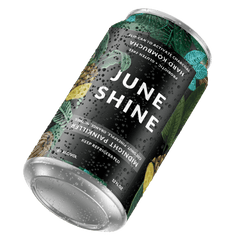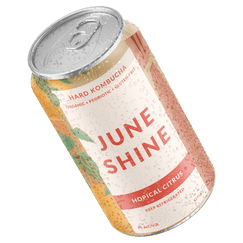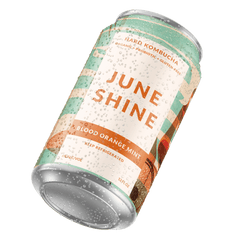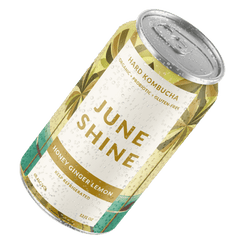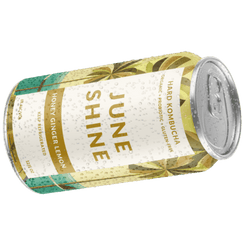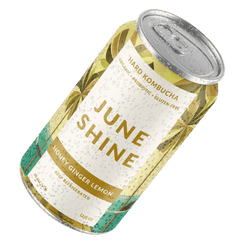These 7 Health Benefits of Acai Are Impressive

Açai berries. Say it with us now… “Ah-sigh-eee!” Maybe a little tricky to pronounce at first, but this delicious and nutritious berry deserves to be called by its true name. So, come prepared when you order your next acai smoothie bowl or down a can of Acai Berry Hard Kombucha.
Acai is more than a fun-to-pronounce berry, though. It has tremendous health benefits and an interesting history to match its unique flavor profile and moniker.
What Is Acai?
If you’ve missed out on the acai craze, don’t worry. We’ll catch you up to speed. Acai berries are a small, one-inch round fruit that grows on acai palm trees in Central and South America. They have dark purple skin and, despite the name, are actually considered drupes since they have hard pits.
Their taste is considered an earthy cross between blackberries and chocolate. The fresh berries have a short shelf life and are not available outside of Central and South America. For this reason, they’re sold here in the States as a frozen treat, a pressed juice, or acai powder.
Acai’s History
You probably know of acai from the bowls offered at trendy brunch places, or you’ve seen them in the frozen section of your local grocery store, but it wasn’t until very recently that they made their way to the US.
Acai grows like a weed across the Amazon River delta in South America and has been a staple of the diet since before recorded history. The region’s first settlers, the floodplain tribes, regularly enjoyed the fruit’s benefits. Nowadays, locals still swear by the so-called superfood.
For centuries, the native ribeirinhos, or river people, have harvested the berries by climbing the tall acai palm trees where they grow. They bring down clusters of acai and soak them for hours in water. Once properly softened, the river people rub off the skin and flesh of the berries and pit them.
A common side dish with fish, the locals enjoy the berry so much they often say, “Without acai, I’m still hungry.”
Acai Berries Travel the World
Like all good things, word of acai berries spread quickly. In the early 1970s, the river people began migrating north to larger capital cities, bringing their coveted acai berries along.
Due to their popularity in the north, the berries began to catch on in the southern cities of Rio and São Paulo a decade later, where a famous martial-arts family made the fruit a part of their special diet popular in their many gyms.
This pushed other athletes to get in on the trend. Surfers, soccer players, and volleyball players enjoyed acai’s nutrients and weight loss properties and were some of the first to enjoy it frozen as acai bowls and smoothies, since the fruit needed to be frozen when shipped to preserve its pulp.
Acai started to appear alongside granola, bananas, and raspberries at beachside juice bars in the nineties. Soon, acai bars were popping everywhere. Exports of the fruit from the Amazon River delta went from two tons per month to 30 by the end of the decade.
Acai Berries in 2000 and Beyond
By the 2000s, acai made its way north to the USA. At first, the berry enjoyed popularity in small communities in Hawaii and California since surfing communities enjoyed them so much as a pick-me-up.
It wasn’t until a wellness book featuring acai found its way onto Oprah’s Book Club that things started to change.
By 2006, conglomerates started to sell acai flavored juice, and acai drinks began lining the shelves of grocers far and wide.
We saw the naturally sweet berry as a perfect flavoring for our Acai Berry Hard Kombucha. Now you can enjoy subtle earthiness that satisfies like a glass of wine but refreshes in the way only JuneShine can.
The Benefits of Acai Berries
With such a great taste and several fun recipes to enjoy, it’s no wonder acai caught on in the States. One of the biggest reasons for the boom in popularity in the last decade is acai’s many health benefits.
1. Acai’s Nutrition Profile
Acai didn’t get the superfood moniker without being, well, super. Unlike most fruits, acai berries are high in fat and low in sugar. One hundred grams of the fruit has only 70 calories, five grams of heart-healthy fat, four grams of carbs, 2 grams of sugar, and two grams of fiber.
Decent amounts of vitamin A and calcium are also present in the fruit. There are also some trace minerals, including manganese, copper, potassium, and magnesium. Acai also benefits from the 19 amino acids that help protect against various environmental stressors.
One of the most notable plant compounds found in acai is anthocyanins. These are what give the drupe its purplish color and are found in fruits like blueberries and blackberries. Anthocyanins are a type of flavonoid with antioxidant effects, which account for some of acai’s health benefits, including improved visual and neurological health.
2. High Levels of Antioxidants
Speaking of antioxidants, acai berries are chock-full of them.
Antioxidants neutralize the effects of free radicals throughout the body. Free radicals might sound like a group of rowdy rockers, but in the human body, they can damage your cells and lead to disease.
Luckily, acai berries have more antioxidants than most other antioxidant-rich fruits like strawberries and cranberries, both of which often accompany acai in breakfast bowls.
Antioxidants are measured using an Oxygen Radical Absorbance Capacity score or ORAC value. Compared to 100 grams of blueberries ORAC value of 4669, the same amount of frozen acai pulp has 15,405.
3. Acai and Your Heart
Those looking to reduce the risk of heart-related illness might want to consider upping their intake of anthocyanin.
The fiber and healthy fats found in acai increase good cholesterol while decreasing bad. The fiber content is also associated with lower risk of cardiovascular disease.
4. Brainiac Berries
Another benefit of the high antioxidant levels found in acai is the positive effect on the brain. Much in the same way they lower oxidative stress on the heart, acai berries can help lower stress on the brain while promoting brain health.
Increased blood flow to the brain slows the aging process and helps it work more efficiently, which leads to improved cognition, alertness, and memory. The antioxidants help clean up the cells that are toxic or no longer working and make way for new nerves to form. This enhances communication between brain cells and keeps your mind sharp as you age.
5. All the Acai Benefits You Didn’t Know You Needed
Studies have shown that polyphenolic compounds in acai can reduce the development of malfunctioning cells. This helps to boost the immune system.
The extremely high level of antioxidants in acai also makes it great for skincare. Some oil extracts can be used to moisturize and cleanse the skin.
Weight loss is also a side effect of acai consumption. This is because acai curbs cravings and is a healthy, tasty alternative to fast food and other unhealthy food options.
Why Acai?
If you have read this far, then it should be no wonder why we were quick to pick Acai Berry as a flavor in our Hard Kombucha. This ingredient is a superfood, and it makes for a super drink—but it’s not like we’re biased or anything.
Sources:
Acai The Roots Of A Super Fruit | Nature.org
Acai berries: Do they have health benefits? | Mayo Clinic
“5 Impressive Health Benefits of Acai Berries.” | Healthline
5 Impressive Health Benefits of Acai Berries | Sioux Falls
Acai berries: Health benefits, nutrition, diet, and risks | MedicalNewsToday
acai | Description, Fruit, & Nutrition | Britannica
“5 Impressive Health Benefits of Acai Berries.” | Healthline
Strange Fruit | The New Yorker
History of Acai | abilityhub.com
[Characterization of the acai or manaca (Euterpe oleracea Mart.): a fruit of the Amazon] | NIH.gov
Health What Are ORAC Values? | Scientific American
Fiber, Lipids, and Coronary Heart Disease | Circulation
Pro-apoptotic activities of polyphenolics from açai (Euterpe oleracea Martius) in human
